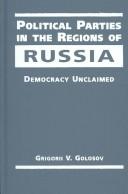Book
Year: 1965 Publisher: Moskva : Voennoe Izdatelʹstvo Ministerstva oborony SSSR,
Abstract | Keywords | Export | Availability | Bookmark
 Loading...
Loading...Choose an application
- Reference Manager
- EndNote
- RefWorks (Direct export to RefWorks)
Book
Year: 1947 Publisher: Paris : Colin,
Abstract | Keywords | Export | Availability | Bookmark
 Loading...
Loading...Choose an application
- Reference Manager
- EndNote
- RefWorks (Direct export to RefWorks)
Book
Year: 1891 Volume: 4
Abstract | Keywords | Export | Availability | Bookmark
 Loading...
Loading...Choose an application
- Reference Manager
- EndNote
- RefWorks (Direct export to RefWorks)
Book
ISBN: 9781800611160 1800611161 Year: 2022 Publisher: New Jersey World Scientific
Abstract | Keywords | Export | Availability | Bookmark
 Loading...
Loading...Choose an application
- Reference Manager
- EndNote
- RefWorks (Direct export to RefWorks)
"After the gradual slowing down of the "third wave of democratization," electoral authoritarianism is rapidly emerging as a dominant form of contemporary autocracy. Political parties play a key role within the political and institutional structures of electoral autocracies. Pro-regime parties provide the dictatorial executive with electoral and legislative tools of sustaining power. At the same time, permitted opposition parties, while normally incapable of challenging the regime, are important for regime sustainability because they perform such vital functions as co-opting actual or potential opposition groups, facilitating power-sharing, and mobilizing electoral participation. The interactions among the dominant parties and the permitted opposition parties, if displaying sustainable cross-temporal patterns, constitute authoritarian party systems. Authoritarian Party Systems provides a theoretical discussion of electoral authoritarianism with special reference to authoritarian party systems; a methodological overview of party system research with special reference to the problems caused by the authoritarian nature of the observed party systems; a comprehensive cross-regional and historical overview of authoritarian party systems; a quantitative analysis of their structural characteristics, including fragmentation, party system format, volatility, and nationalization; and in-depth discussions of the political regime determinants of authoritarian party systems and of the interplay between party systems and other components of the authoritarian institutional order. Quantitative analysis has been performed on an original database comprising cases of party-structured authoritarian regimes between 1945-2019. This content of the book is illustrated by case studies drawn from across the spectrum of contemporary authoritarian regimes"--
Book
Year: 1984 Publisher: Moskva "Sovetskii kompozitor"
Abstract | Keywords | Export | Availability | Bookmark
 Loading...
Loading...Choose an application
- Reference Manager
- EndNote
- RefWorks (Direct export to RefWorks)
Book
Year: 1993 Publisher: Amonk Sharpe
Abstract | Keywords | Export | Availability | Bookmark
 Loading...
Loading...Choose an application
- Reference Manager
- EndNote
- RefWorks (Direct export to RefWorks)
Book
Year: 1970 Publisher: Kiiv Vidavnitstvo khudozhnoi literaturi "Dnipro"
Abstract | Keywords | Export | Availability | Bookmark
 Loading...
Loading...Choose an application
- Reference Manager
- EndNote
- RefWorks (Direct export to RefWorks)
Book
Year: 1970 Publisher: Kiiv Vidavnitstvo khudozhnoi literaturi "Dnipro"
Abstract | Keywords | Export | Availability | Bookmark
 Loading...
Loading...Choose an application
- Reference Manager
- EndNote
- RefWorks (Direct export to RefWorks)

ISBN: 1626374171 9781626374171 1588262170 9781588262172 Year: 2022 Publisher: Boulder
Abstract | Keywords | Export | Availability | Bookmark
 Loading...
Loading...Choose an application
- Reference Manager
- EndNote
- RefWorks (Direct export to RefWorks)
Political parties typically are assumed to be essential for contemporary democratic government and governance. Why, then, has the regime change in Russia failed to produce viable political parties? Grigorii Golosov addresses this question, exploring issues central to an understanding of Russian political development. Golosov combines statistical and qualitative analysis, including case studies, to explain why political parties have not yet taken hold in Russia's regions. His argument is bolstered by a uniquely comprehensive database of regional elections held in the period 1993-April 2003. Moving from the late Soviet era to current efforts by the federal government to promote a viable party system at the regional level, his work is a pathbreaking contribution to both Russian studies and comparative politics.
Political parties --- Political culture --- Democracy --- Democratization --- Self-government --- Political science --- Equality --- Representative government and representation --- Republics --- Russia (Federation) --- Politics and government
Book
Year: 1968 Publisher: Osnabrück : Biblio-Verlag,
Abstract | Keywords | Export | Availability | Bookmark
 Loading...
Loading...Choose an application
- Reference Manager
- EndNote
- RefWorks (Direct export to RefWorks)
Ural Mountains Region (Russia) --- Kyrgyzstan --- Description and travel.

 Search
Search Feedback
Feedback About UniCat
About UniCat  Help
Help News
News